Editor’s note: This is a recurring post, regularly updated with new information.
Credit cards compete for the top spot in your wallet by offering high-value bonus multipliers for purchases in various categories, including travel, dining and groceries.
But even if you spend the bulk of your budget in these categories, you probably aren’t going grocery shopping or buying plane tickets every single day. Not as many cards step up to the plate to offer bonus points on the one thing a lot of us have to do every single day: commute to and from work or school.
If you’re looking to earn bonus points on this often unavoidable expense, here are the top cards you should consider.
The best credit cards for commuting expenses
| Card name | Earning rate on commuting | Value of points or cash back earned per dollar spent* | Annual fee |
| American Express® Green Card | 3 points per dollar. | 6 cents. | $150 (see rates and fees). |
| Chase Sapphire Reserve | 3 points per dollar. | 6 cents. | $550. |
| Amtrak Guest Rewards® Preferred Mastercard® | 2-3 points per dollar. | 5-7.5 cents. | $99. |
| U.S. Bank Cash+® Visa Signature® Card | 5% cash back (up to $2,000 across chosen bonus categories each quarter). | 5 cents. | $0 |
| Citi Custom Cash℠ Card | 5% cash back (up to $500 of spending per billing cycle in your top spending category.) | 5 cents. | $0 |
| U.S. Bank Altitude® Reserve Visa Infinite® Card | 3 points per dollar. | 4.5 cents. | $400. |
| Chase Sapphire Preferred Card | 2 points per dollar. | 4 cents. | $95. |
| Capital One Venture Rewards Credit Card | 2 miles per dollar. | 3.7 cents. | $95. |
| Capital One Venture X Rewards Credit Card | 2 miles per dollar. | 3.7 cents. | $395. |
| Alaska Airlines Visa® credit card | 2 miles per dollar. | 3.6 cents. | $95. |
| World of Hyatt Credit Card | 2 points per dollar. | 3.4 cents. | $95. |
| World of Hyatt Business Credit Card | 2 points per dollar. | 3.4 cents. | $199. |
| Blue Cash Preferred® Card from American Express | 3% cash back. | 3 cents. | $0 introductory annual fee, then $95 (see rates and fees). |
| Bank of America® Premium Rewards® credit card | 2-3.5 points per dollar. | 2-3.5 cents. | $95. |
*Valuations are based on TPG’s latest calculations and are not provided by the credit card issuers.
The information for the Amex Green, U.S. Bank Altitude Reserve and Amtrak Guest Rewards Preferred card has been collected independently by The Points Guy. The card details on this page have not been reviewed or provided by the card issuer.
A closer look at the cards you should use for commuting expenses
American Express® Green Card
Welcome offer: Earn 40,000 points after you spend $2,000 on purchases in the first six months from account opening.
Annual fee: $150 (see rates and fees).
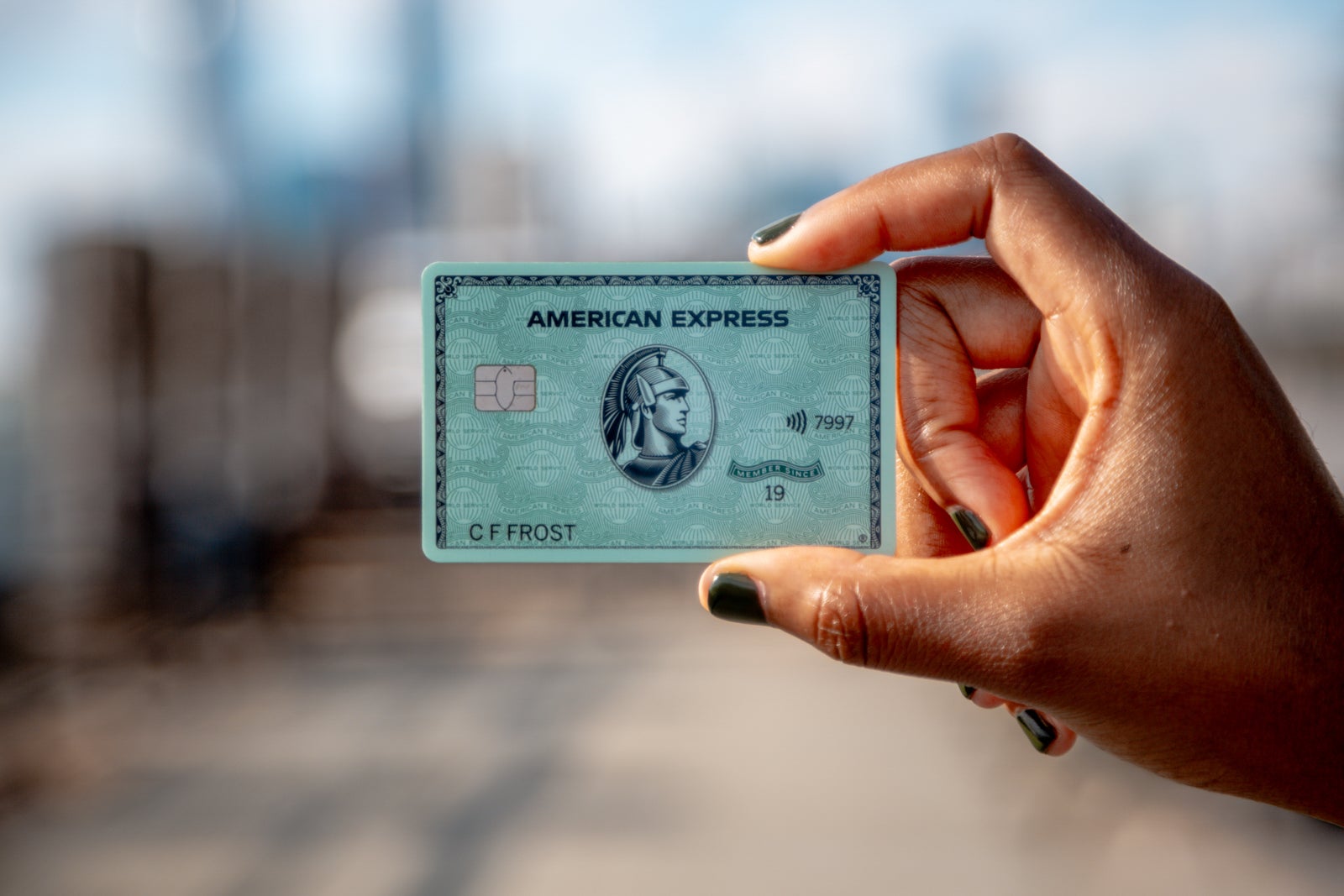
Why we like it: Like the Chase cards above, America Express defines “travel” pretty broadly as it applies to the Amex Green card. The card earns valuable Membership Rewards points, which can be used with some great transfer partners. With this card, you’ll earn 3 points per dollar on travel and transit. You’ll also earn 3 points per dollar at restaurants (including takeout and delivery) in the U.S. and 1 point per dollar on all other purchases.
Three items add significant value to the Amex Green card:
- You get a full six months to complete the spending for the welcome offer.
- You receive a $189 Clear credit each year.
- You receive a $100 LoungeBuddy credit each year.
TPG values Membership Rewards points at 2 cents apiece. Thus, the welcome offer is worth $800, and the points you earn on commuting expenses represent a 6% return on spending.
Read our American Express® Green Card review for more details.
Chase Sapphire Reserve
Sign-up bonus: Earn 60,000 points after you spend $4,000 on purchases within the first three months of account opening.
Annual fee: $550.
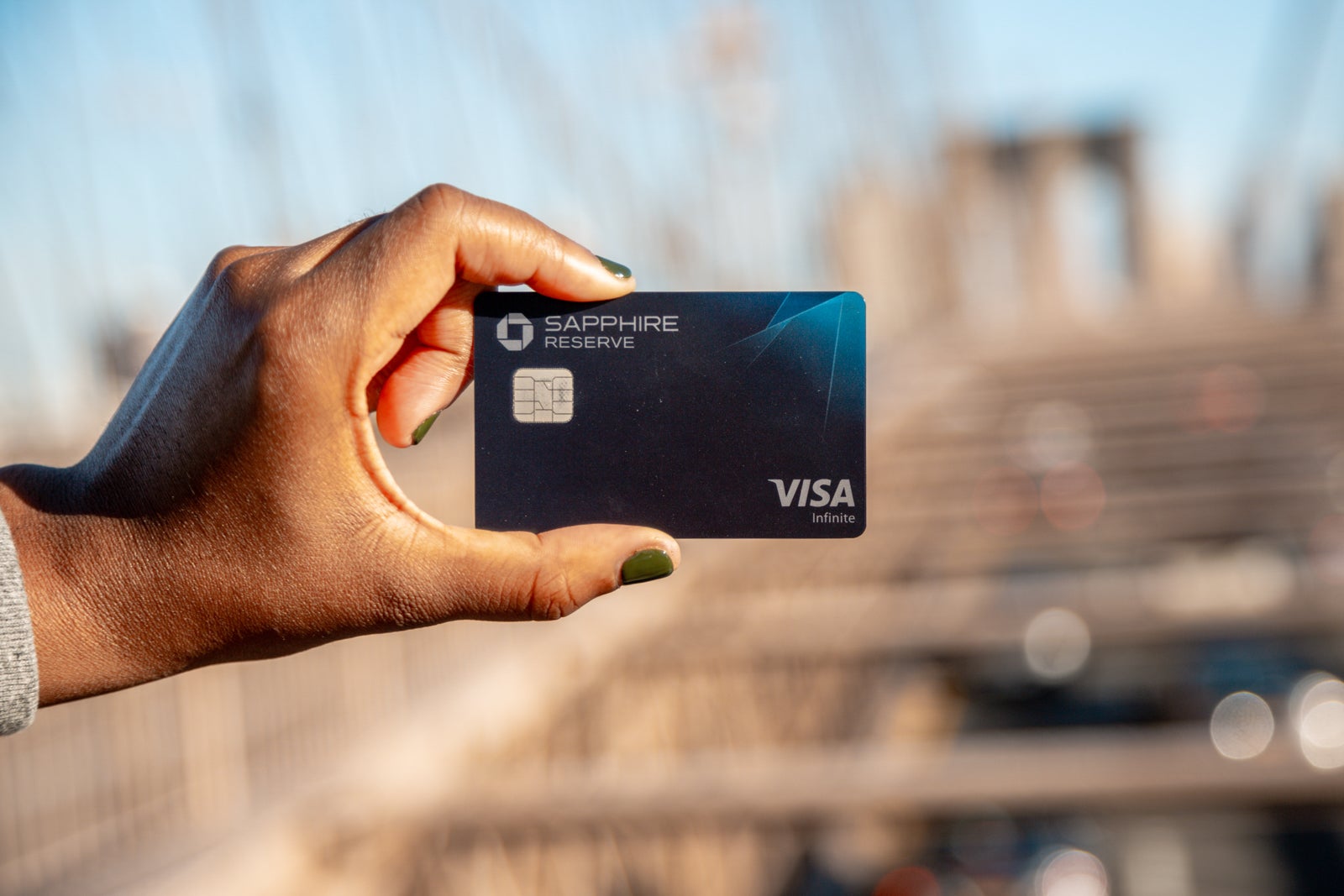
Why we like it: You’re not going to find the word “commute” anywhere in the fine print on this card, but the Chase Sapphire Reserve’s beloved 3 points per dollar on travel purchases will extend to your morning commute. Chase defines travel in the broadest way possible. You’ll earn bonus Ultimate Rewards points for all the conventional things like airfare and hotels, but you’ll also earn for ride-hailing services like Uber, public transit, toll bridges and highways — and even some parking fees.
Chase also has a partnership with Lyft through March 2025, allowing you to earn 10 points per dollar spent on these purchases.
This makes the Sapphire Reserve a great choice for your day-to-day life and for your vacations as well. The welcome bonus will jump-start you toward your next tropical getaway. Plus, its annual fee is largely offset by a $300 annual travel credit. This credit is automatically applied to any eligible purchases you make (though note you won’t earn points for the travel this credit reimburses). So you might even find yourself getting reimbursed for your commute by Chase if you pay with a Sapphire Reserve.
The Sapphire Reserve also offers 10 points per dollar on hotel and car rental purchases booked through the Ultimate Rewards Travel portal and 5 points per dollar on airline travel booked through the Ultimate Rewards Travel portal.
Read our Chase Sapphire Reserve review for more details.
Apply here: Chase Sapphire Reserve
Amtrak Guest Rewards Preferred Mastercard
Sign-up bonus: Earn 30,000 bonus points after spending $1,000 on the card within the first three billing cycles of account opening.
Annual fee: $99.
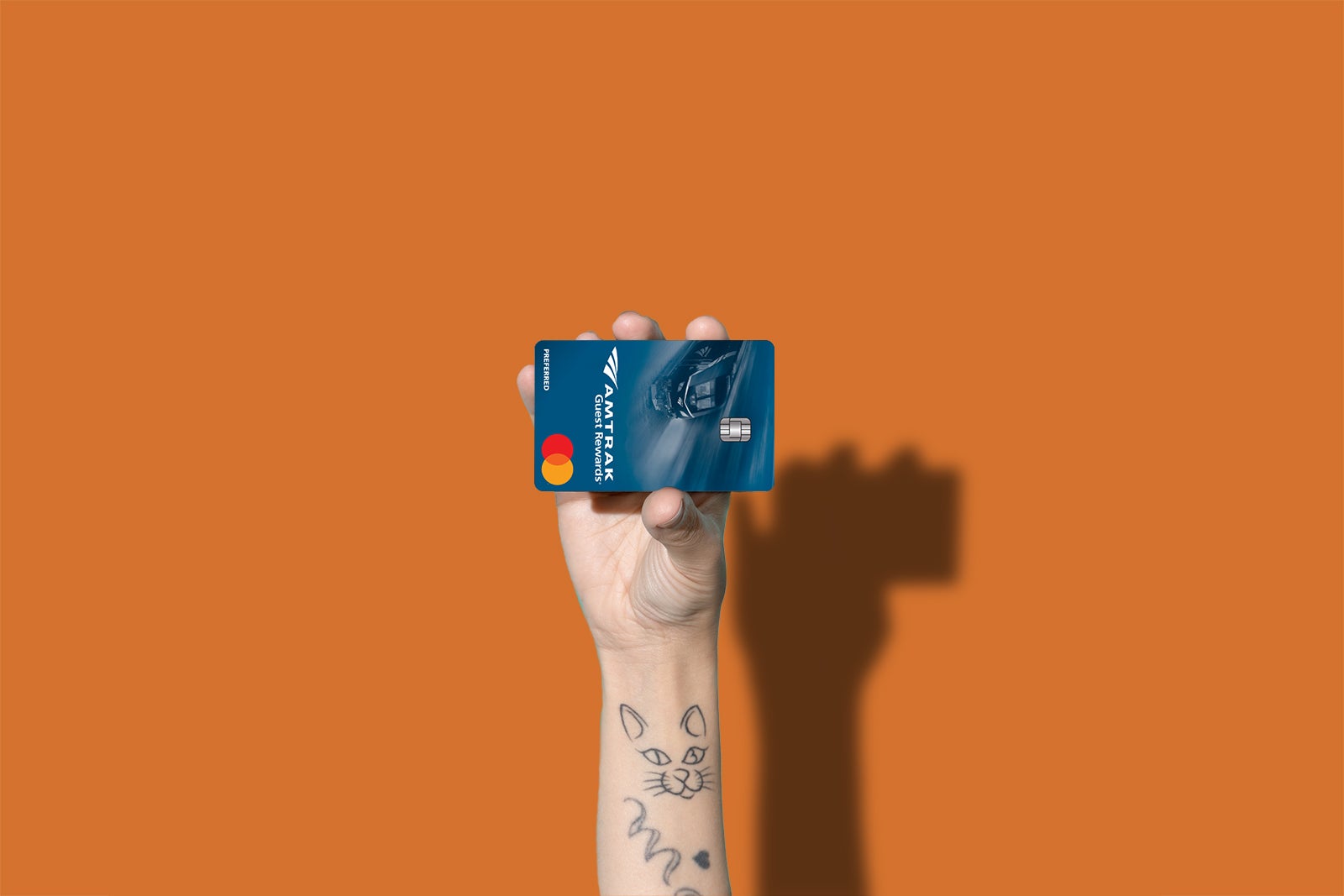
Why we like it: Cardholders earn 3 points per dollar with Amtrak (including onboard purchases) and 2 points per dollar on dining, travel, transit and rideshare purchases. This covers numerous types of transit, and Amtrak points can be quite valuable. TPG values Amtrak Guest Rewards points at 2.5 cents each.
Additionally, cardholders receive valuable perks at account opening and on each account anniversary, including one-class upgrade awards, a round-trip companion pass and lounge passes. Those benefits are on top of an ongoing 5% points rebate when redeeming with Amtrak Guest Rewards, waived points expiration policies and a 20% rebate on onboard food and beverage purchases. For those whose primary transit method is by train, this could be a great card for your wallet.
U.S. Bank Cash+® Visa Signature® Card
Sign-up bonus: Earn a $200 rewards bonus after you apply online and spend $1,000 on eligible purchases within the first 120 days of account opening.
Annual fee: $0.

Why we like it: The U.S. Bank Cash+® Visa Signature® Card allows you to choose two categories for 5% cash-back earnings and one category for 2% earnings, while all other purchases earn 1% back. Note that your 5% earning is capped at $2,000 in spending each quarter on combined purchases in your two chosen categories, and “Ground Transportation” is one of the eligible categories. So long as your spending on that category and your other chosen category doesn’t surpass $2,000 in a given quarter, you’ll earn 5% back on all of your commuting expenses.
Given that there’s no annual fee, you won’t receive a lot of perks on the Cash+ Visa card. However, the ability to choose your bonus categories and earn up to $400 cash back on your 5% categories each year (plus unlimited earnings in the chosen 2% category and 1% on everyday spending) means this could be a strong earner for your daily commute.
Read our Cash+ Visa card review for more card information.
Apply here: U.S. Bank Cash+® Visa Signature® Card
Citi Custom Cash Card
Sign-up bonus: Earn $200 cash back after spending $1,500 on purchases in the first six months from account opening.
Annual fee: $0.
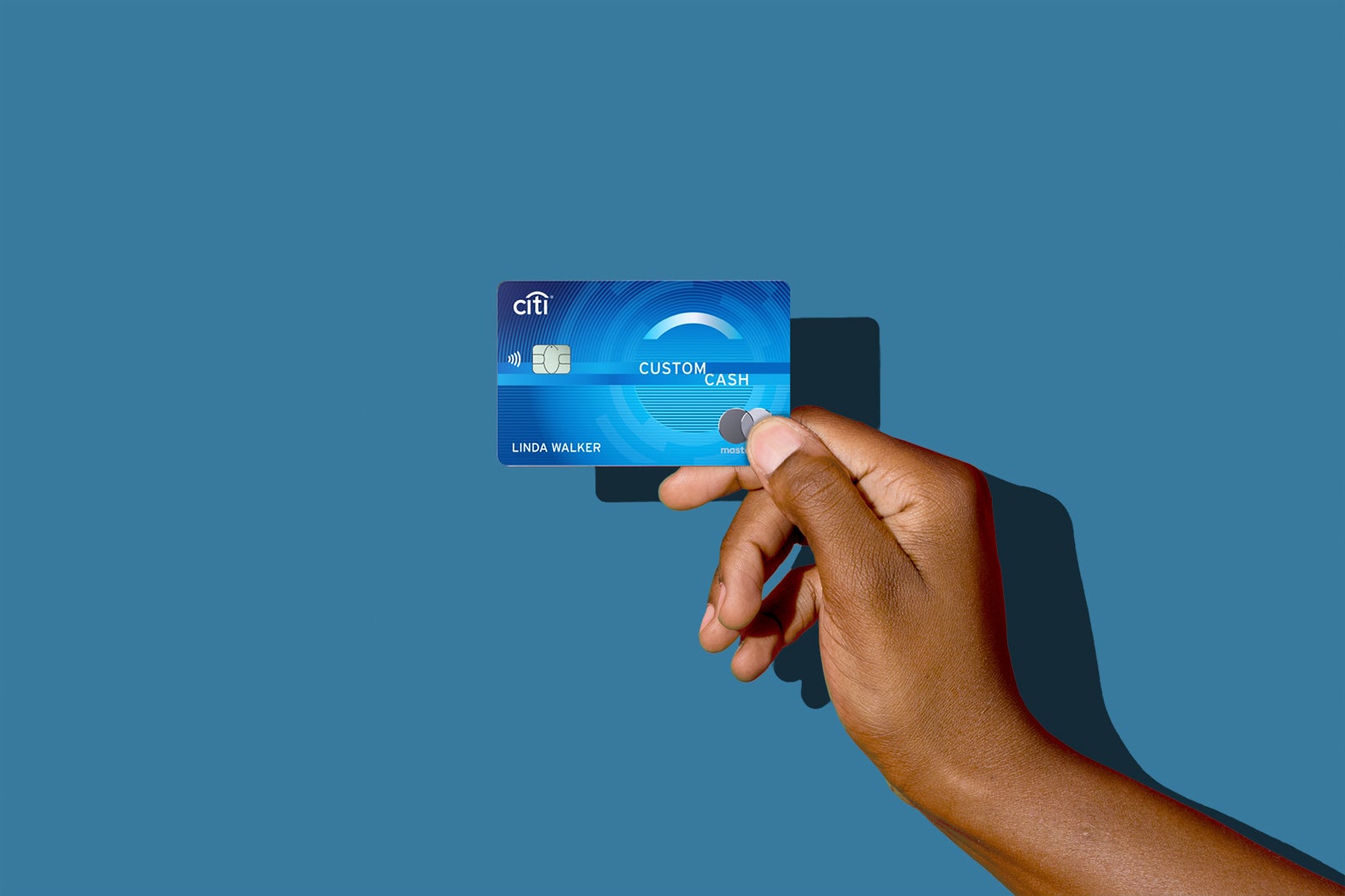
Why we like it: You’ll earn 5% back in your top spending category each billing cycle without the need to choose a category in advance. The nice thing about this is that you can earn elevated cash back on expenses you didn’t foresee, given that it applies automatically to whichever category you spent the most money in during that billing cycle. Categories include travel and transit (separate categories).
Unfortunately, the 5% earning rate only applies to the first $500 spent in that category during a billing cycle, then 1% cash back after that. If you’re spending more than $500 per month on transit and commuting, this might not be the right card for you. For those who spend less than this, 5% cash back without needing to choose your category in advance is a great deal for a card without an annual fee.
Read our Citi Custom Cash Card review for more card information.
Apply here: Citi Custom Cash℠ Card
U.S. Bank Altitude Reserve Visa Infinite® Card
Sign-up bonus: Earn 50,000 bonus points after you spend $4,500 on purchases in your first 90 days from account opening.
Annual fee: $199.

Why we like it: The U.S. Bank Altitude Reserve Visa Infinite® Card offers 3 points per dollar on a broad travel category that includes commuting expenses. You’ll earn 5 points per dollar on prepaid hotels and car rentals booked directly in the Altitude Rewards Center and 3 points per dollar on all purchases made with the Apple Pay, Google Pay and Samsung Pay mobile-wallet systems. Qualifying mobile-app purchases can be made in a store, in app or online. Eligible travel purchases include those made directly with airlines, hotels, car rentals, taxicabs, limousines, trains and cruise lines. You’ll earn 1 point per dollar spent on all other purchases.
The Altitude Reserve card also has $325 in travel credits each year, which will apply automatically to purchases from airlines, hotels, car rentals, taxis, limousines, trains and cruise lines. However, you must be an existing U.S. Bank customer to apply for this card.
Read our Altitude Reserve review for more card information.
Chase Sapphire Preferred
Sign-up bonus: Earn 60,000 points after you spend $4,000 on purchases in the first three months from account opening.
Annual fee: $95.

Why we like it: Like the Sapphire Reserve above, the Sapphire Preferred defines travel in the broadest of terms and earns valuable Ultimate Rewards points. With this card, you’ll earn 2 points per dollar on most travel. You’ll earn 5 points per dollar on travel purchased through the Chase travel portal, 3 points per dollar on select streaming services and online grocery purchases, 3 points per dollar on dining and 1 point per dollar on everything. Plus, through March 31, 2025, you can earn 5 points per dollar on Lyft rides.
The Sapphire Preferred has strong earnings on a broad range of categories beyond just commuting expenses, making it a great everyday card for your wallet. And the 60,000-point welcome bonus (earned after you spend $4,000 in the first three months of account opening) is worth $1,200, according to TPG’s valuations. Plus, the card also has a $50 annual hotel credit, which offsets more than half of the annual fee.
Read our Chase Sapphire Preferred review for more details.
Apply here: Chase Sapphire Preferred
Capital One Venture Rewards Credit Card
Sign-up bonus: Earn 75,000 miles after spending $4,000 on the card within the first three months of account opening.
Annual fee: $95.

Why we like it: The Capital One Venture Rewards Credit Card earns 2 Capital One miles per dollar on nearly everything. The simplicity of that is the card’s bread and butter. You’ll also earn 5 miles per dollar spent on hotels and car rentals booked through Capital One Travel and 5 miles per dollar spent on cars booked through Turo (through May 16, 2023).
The Venture card also offers several travel protections and perks like reimbursement for your Global Entry or TSA PreCheck application fee. The card’s more expensive sibling — the Capital One Venture X Rewards Credit Card — has more perks and benefits, but none of those will apply to your daily commute in a taxi or subway. And you would still earn the same amount of points on your spending, despite a much higher annual fee. Thus, the Venture card is a better fit for this list.
Read our Venture card review for more card information.
Apply here: Capital One Venture Rewards Credit Card
Capital One Venture X Rewards Credit Card
Sign-up bonus: Earn 75,000 miles after spending $4,000 on the card within the first three months of account opening.
Annual fee: $395.

Why we like it: Like the Venture card above, the Venture X card earns 2 Capital One miles per dollar on nearly everything. You’ll also earn 10 miles per dollar on hotels and rental cars booked through Capital One Travel and 5 miles per dollar on flights booked in this portal. Plus, you’ll earn 10 miles per dollar spent on cars booked through Turo (through May 16, 2023).
The Venture X card also offers several travel protections and perks like reimbursement for your Global Entry or TSA PreCheck application fee, up to $300 in annual travel credits
Read our Venture X card review for more card information.
Apply here: Capital One Venture X Rewards Credit Card
Alaska Airlines Visa credit card
Sign-up bonus: Earn 70,000 bonus miles plus Alaska’s Famous Companion Fare™ from $122 ($99 fare plus taxes and fees from $23) after spend $3,000 on purchases within the first 90 days from account opening.
Annual fee: $95.
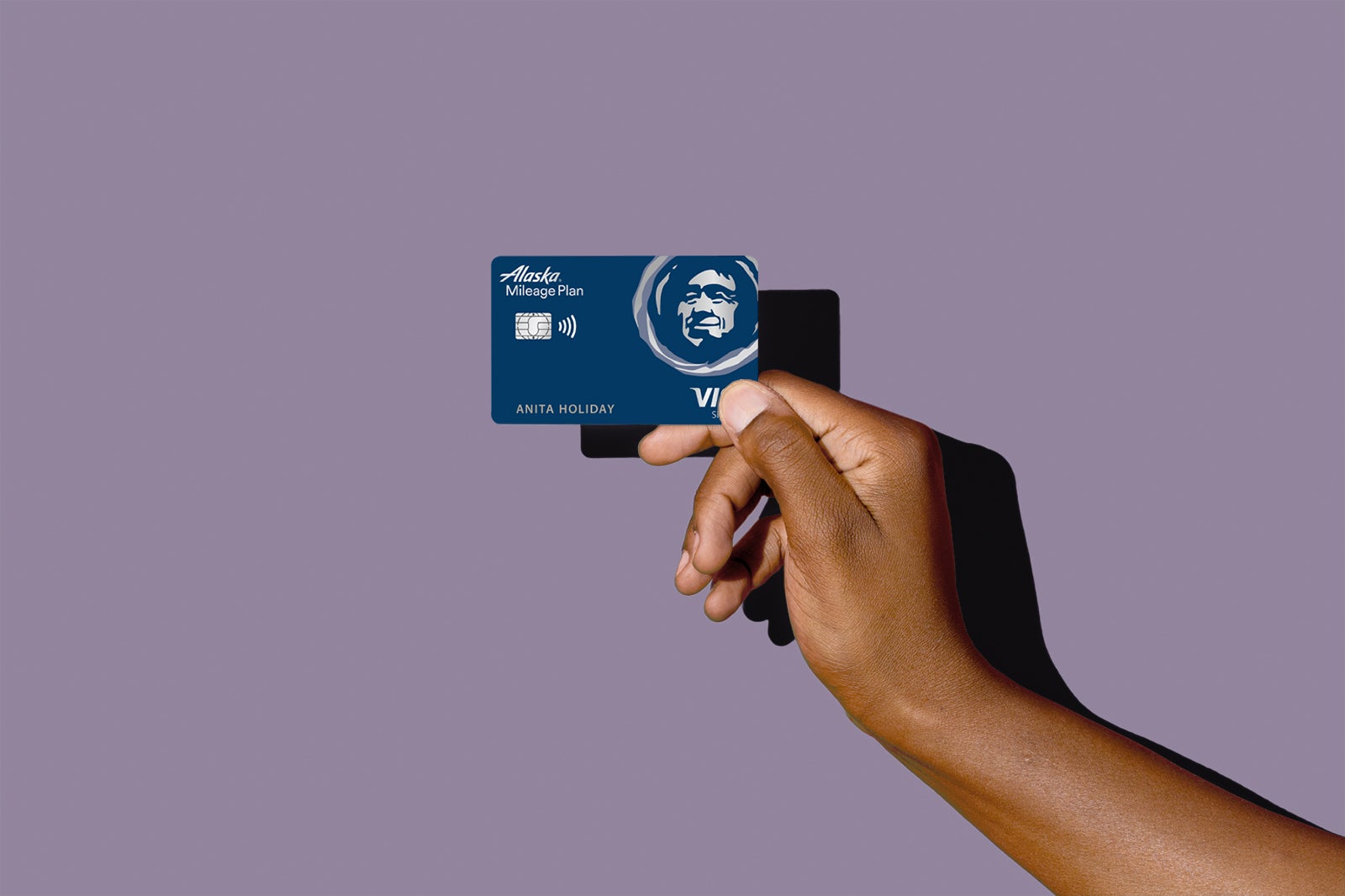
Why we like it: Recent changes to the Alaska Airlines Visa card saw the addition of bonus earnings for local transit (including ride-hailing apps), meaning you can earn 2 miles per dollar in this category, as well as 2 miles per dollar on gas, cable and select streaming services. You’ll also earn 3 miles per dollar on Alaska Airlines purchases and 1 mile per dollar on other purchases.
Alaska Airlines miles are the most valuable airline miles in our points and miles valuations, meaning you’re earning a quality return on your commuting expenses. The card also offers perks like priority boarding, a free first checked bag and earning 10% bonus miles on each purchase if you have qualifying bank accounts with Bank of America.
Read our Alaska Airlines Visa card review for more card information.
Apply here: Alaska Airlines Visa credit card
World of Hyatt Credit Card
Sign-up bonus: Earn up to 60,000 points. Earn 30,000 bonus points after you spend $3,000 on purchases within the first three months from account opening. Earn 2 points per dollar on purchases that typically earn 1 point per dollar — up to $15,000 of these purchases in the first six months from account opening for a total of up to 30,000 points.
Annual fee: $95.
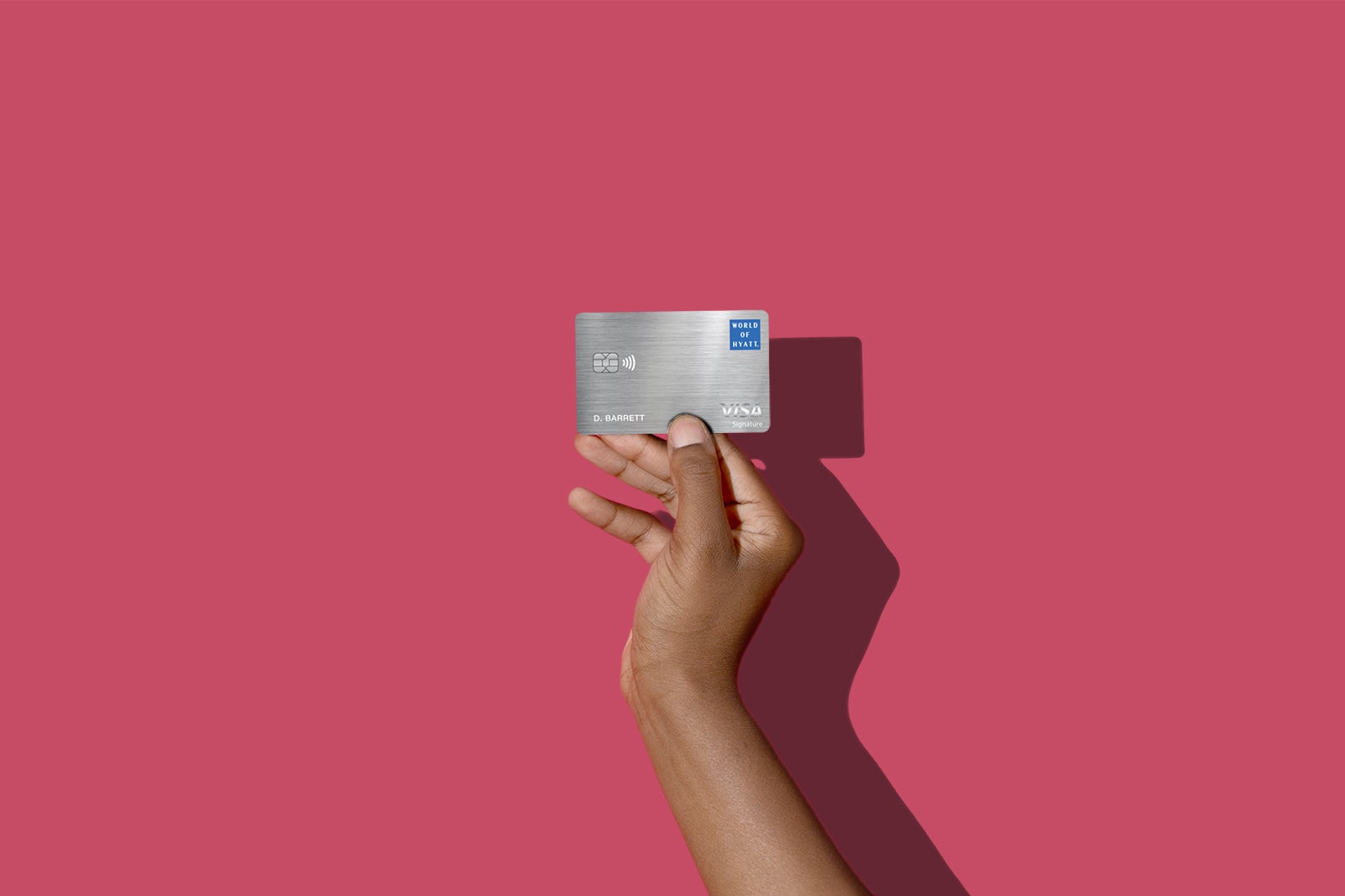
Why we like it: The World of Hyatt Credit Card offers commuters 2 points per dollar on all local transit and commuting expenses, which is great whether you’re heading to a vacation spot or just heading to work or school. Eligible expenses include taxis, mass transit and ride-hailing services.
The card’s benefits extend to your stays at Hyatt as well. You receive automatic Discoverist status, which is good for travelers who don’t frequent Hyatt. For travelers who want to earn higher elite status, this card can help you with that, too. You’ll receive five elite night credits from the card automatically and two additional night credits for every $5,000 you spend on the card in a calendar year.
On your Hyatt stays, you’ll earn 4 points per dollar when you swipe your card (in addition to the points you earn as a World of Hyatt member). And best of all, you’ll receive a Category 1-4 free night each year when you renew the card. You can earn a second free night when you spend $15,000 on the card in a calendar year.
Read our World of Hyatt Card review for more card information.
Apply here: World of Hyatt Credit Card
World of Hyatt Business Credit Card
Sign-up bonus: Earn 60,000 bonus points after you spend $5,000 on purchases in your first three months from account opening.
Annual fee: $199.
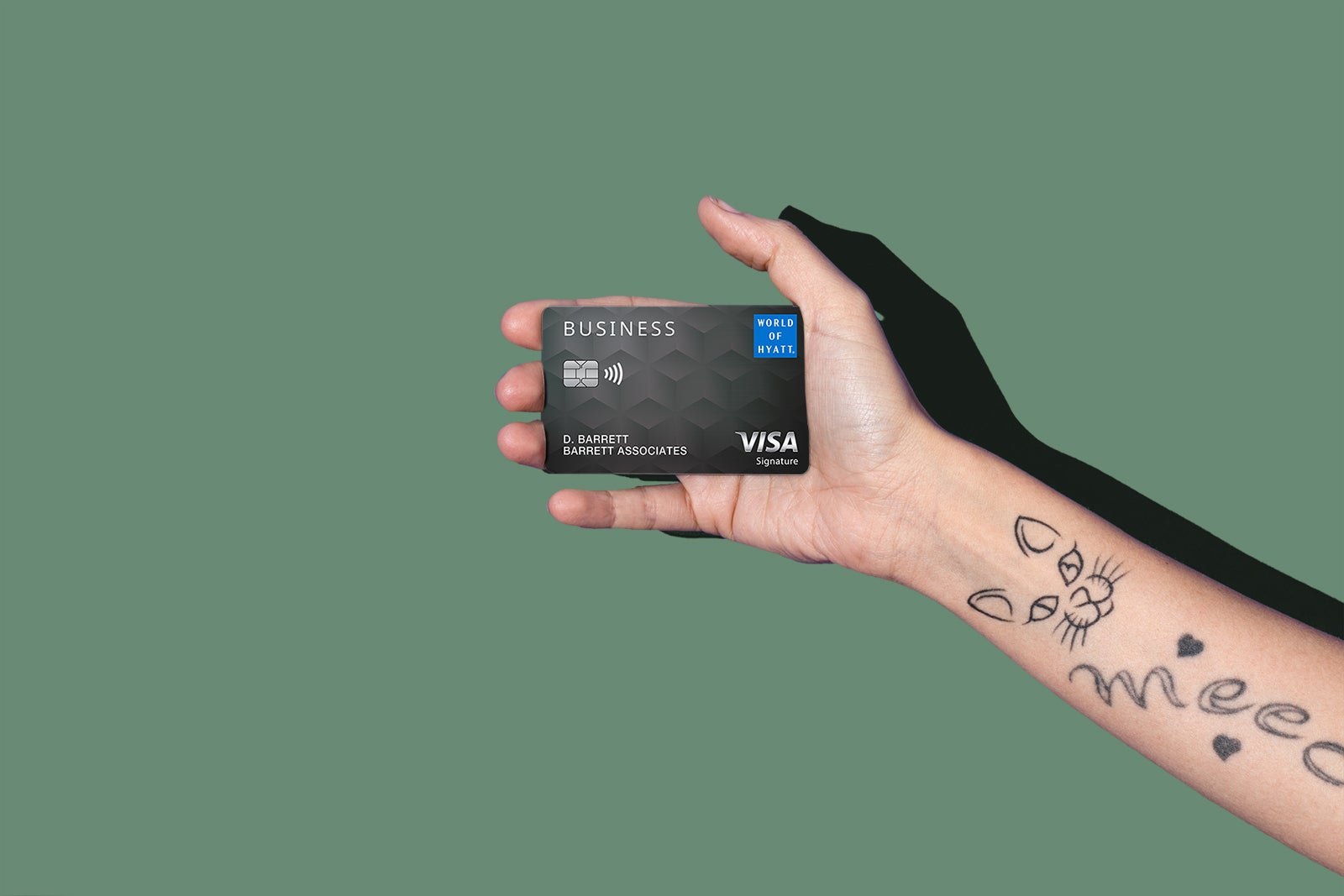
Why we like it: The World of Hyatt Business Credit Card offers 2 points per dollar in the business categories where you spend the most each quarter. This applies to the three categories where you spend the most through the end of 2023. However, starting in 2024, you earn 2 points per dollar in the two categories where you spend the most each quarter. “Local transit and commuting” is one of the eligible categories, and there is no limit to the number of points you can earn in this category.
Beyond this bonus category, cardmembers also earn 4 points per dollar spent at Hyatt hotels, at participating Small Luxury Hotels of the World and on eligible Lindblad Expeditions. Additionally, cardmembers earn 2 points per dollar spent on fitness club and gym memberships, and you’ll also earn 2 points per dollar on Find experiences (however, if you purchase these at a Hyatt property, you will earn 4 points per dollar spent). All other purchases earn 1 point per dollar spent.
Along with automatic Discoverist status (the lowest tier with World of Hyatt), you can also spend your way toward status. You’ll earn five nights’ worth of stay credits for each $10,000 spent on the card. You can also receive up to $100 in credits for Hyatt spending each year and unlock a 10% points rebate by spending $50,000 on the card in a calendar year.
Read our World of Hyatt Business Card review for more card information.
Apply here: World of Hyatt Business Credit Card
Blue Cash Preferred Card from American Express
Welcome bonus: Earn $250 cash back (as a statement credit) after spending $3,000 on purchases in the first six months of card membership.
Annual fee: $0 introductory annual fee, then $95 (see rates and fees).

Why we like it: You’ll earn 3% back on transit, which includes taxis, ride-hailing apps, parking, tolls, trains, buses and more. You’ll also earn 6% back on up to $6,000 of purchases at U.S. supermarkets each year (then 1% back), 6% back on U.S. streaming subscriptions, 3% back at U.S. gas stations and 1% back on other purchases.
Given that the transit category is defined very broadly and doesn’t have annual earning / spending limits, this card is a great option for people who use multiple forms of transportation and don’t want to pay a high annual fee.
Read our Blue Cash Preferred Card review for more card information.
Apply here: Blue Cash Preferred Card from American Express
Bank of America® Premium Rewards® credit card
Sign-up bonus: 50,000 bonus points after you make at least $3,000 in purchases in the first 90 days of account opening.
Annual fee: $95.
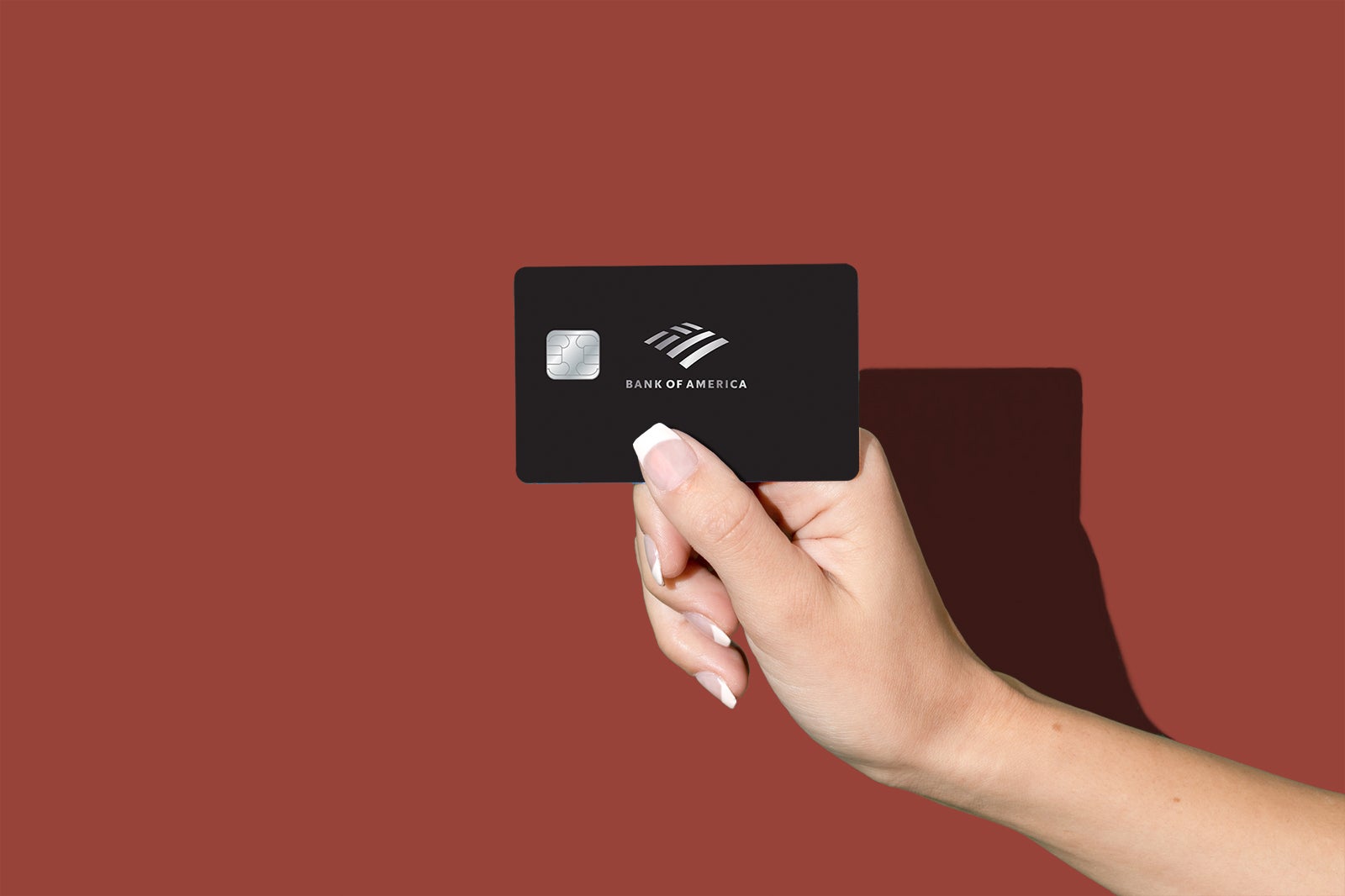
Why we like it: The Bank of America® Premium Rewards® credit card earns 2 points per dollar on travel and dining plus 1.5 points per dollar on everything else. Points are worth a flat 1 cent apiece. Those numbers alone are not impressive and don’t merit a spot on our list of the best cards for commuting. The reason this card enters the list is for those who can maximize the Bank of America Preferred Rewards program. Depending on your tier in Preferred Rewards, you could earn up to 3.5 points per dollar on travel with this card, which includes commuting expenses.
The Premium Rewards card also offers an annual $100 airline incidental credit, Global Entry or TSA PreCheck application fee reimbursement, various travel protections and purchase protection.
Read our Premium Rewards card review for more card information.
Apply here: Bank of America® Premium Rewards® credit card
What if your commute is a drive?
Of course, the cards mentioned above are primarily geared toward transit purchases. In smaller cities (or for those without public transportation options), you may find yourself driving to work or school. In that case, you may be better off selecting a credit card that’s great for gas purchases. While this won’t help with transit purchases, it could be a great option for filling up your tank.
Related: 5 ways to save at the pump
Bottom line
Commuting to and from work can make a long day even longer. While you can’t cut your commute time by carrying the right credit cards, you can get a good amount of points or cash back on transit expenses. Some of the cards with the best “travel” bonus categories include very broad definitions that will cover your morning commute, no matter how many wheels are on the vehicle helping you get there.
Additional reporting by Ethan Steinberg.
For rates and fees of the Amex Green card, click here.
For rates and fees of the Blue Cash Preferred card, click here.



